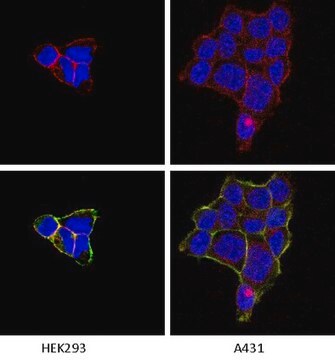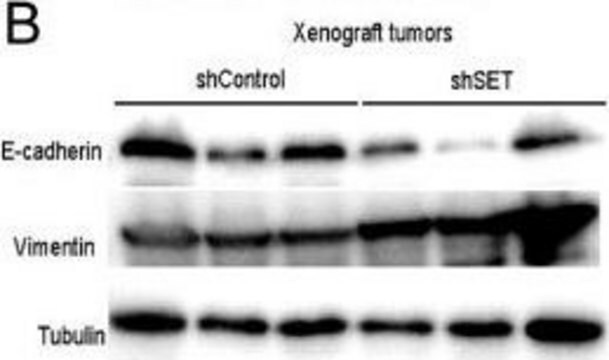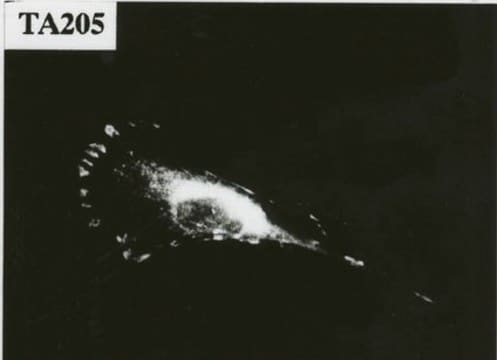MAB1962
Anti-Integrin β2 Antibody, clone P4H9
clone P4H9, Chemicon®, from mouse
Synonym(s):
CD18
Sign Into View Organizational & Contract Pricing
All Photos(1)
About This Item
UNSPSC Code:
12352203
eCl@ss:
32160702
NACRES:
NA.41
Recommended Products
biological source
mouse
Quality Level
antibody form
purified antibody
antibody product type
primary antibodies
clone
P4H9, monoclonal
species reactivity
human
manufacturer/tradename
Chemicon®
technique(s)
immunohistochemistry: suitable
isotype
IgG3
NCBI accession no.
UniProt accession no.
shipped in
wet ice
target post-translational modification
unmodified
Gene Information
human ... ITGB2(3689)
Specificity
beta2 integrin on hematopoeitic cells. Not present on platelets, endothelial cells, epithelial cells or fibroblasts.
Application
Detect Integrin β2 using this Anti-Integrin β2 Antibody, clone P4H9 validated for use in IH.
Research Category
Cell Structure
Cell Structure
Research Sub Category
Integrins
Integrins
Suitable for use in immunofluorescence at 1:1000.
Also suitable for aggregation inhibition assays using hematopoeitic cells or EBV-transformed B lymphocytes.
For extensive dilution, protein-containing or other stabilizing medium should be used. Final working dilutions must be determined by end user.
Also suitable for aggregation inhibition assays using hematopoeitic cells or EBV-transformed B lymphocytes.
For extensive dilution, protein-containing or other stabilizing medium should be used. Final working dilutions must be determined by end user.
Physical form
Format: Purified
Non-sterile buffer of 0.02M phosphate, 0.25M Sodium Chloride, pH 7.6,
0.1% sodium azide.
0.1% sodium azide.
Storage and Stability
Maintain between 2 and 8°C.
Other Notes
Concentration: Please refer to the Certificate of Analysis for the lot-specific concentration.
Legal Information
CHEMICON is a registered trademark of Merck KGaA, Darmstadt, Germany
Disclaimer
Unless otherwise stated in our catalog or other company documentation accompanying the product(s), our products are intended for research use only and are not to be used for any other purpose, which includes but is not limited to, unauthorized commercial uses, in vitro diagnostic uses, ex vivo or in vivo therapeutic uses or any type of consumption or application to humans or animals.
Not finding the right product?
Try our Product Selector Tool.
Storage Class
10 - Combustible liquids
wgk_germany
WGK 2
flash_point_f
Not applicable
flash_point_c
Not applicable
Certificates of Analysis (COA)
Search for Certificates of Analysis (COA) by entering the products Lot/Batch Number. Lot and Batch Numbers can be found on a product’s label following the words ‘Lot’ or ‘Batch’.
Already Own This Product?
Find documentation for the products that you have recently purchased in the Document Library.
Elzbieta Pluskota et al.
The Journal of biological chemistry, 279(17), 18063-18072 (2004-02-11)
Plasmin, the pivotal thrombolytic enzyme, is generated on the surface of many cell types, where urokinase receptor (uPAR)-bound urokinase (uPA) activates cell-bound plasminogen (Plg). It has been reported that neutrophils mediate endogenous thrombolysis involving a uPA-dependent mechanism, and we previously
Elzbieta Pluskota et al.
Blood, 101(4), 1582-1590 (2002-10-24)
Previous studies demonstrated that integrin alpha(M)beta(2) (CD11b/18, Mac-1) forms a physical complex with the urokinase-type plasminogen activator receptor (uPAR/CD87) on leukocytes. In this study, we used human peripheral blood neutrophils and transfected cells expressing alpha(M)beta(2), uPAR, or both receptors to
I N Gavrilovskaya et al.
Journal of virology, 73(5), 3951-3959 (1999-04-10)
Hantaviruses replicate primarily in the vascular endothelium and cause two human diseases, hemorrhagic fever with renal syndrome (HFRS) and hantavirus pulmonary syndrome (HPS). In this report, we demonstrate that the cellular entry of HFRS-associated hantaviruses is facilitated by specific integrins
Yukinori Endo et al.
Cell adhesion & migration, 12(2), 93-100 (2016-10-08)
Anosmin is an extracellular matrix protein, and genetic defects in anosmin result in human Kallmann syndrome. It functions in neural crest formation, cell adhesion, and neuronal migration. Anosmin consists of multiple domains, and it has been reported to bind heparan
Sun-Woo Park et al.
Experimental & molecular medicine, 36(3), 211-219 (2004-07-24)
Betaig-h3 (betaig-h3) is a secretory protein composed of fasciclin I-like repeats containing sequences that allows binding of integrins and glycosaminoglycans in vivo. Expression of betaig-h3 is responsive to TGF-Beta and the protein is found to be associated with extracellular matrix
Our team of scientists has experience in all areas of research including Life Science, Material Science, Chemical Synthesis, Chromatography, Analytical and many others.
Contact Technical Service








